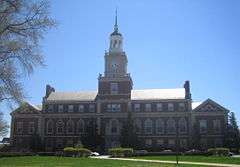Founders Library
 Founders Library, Howard University | |
| Country | United States |
|---|---|
| Established | 1939 |
| Location | Washington D.C.[1] |
| Branches | 73 |
| Collection | |
| Size | 10,000 |
| Access and use | |
| Circulation | 400,000 |
| Other information | |
| Budget | US$30M (2015) |
| Director | Rhea Ballard-Thrower, JD |
| Staff | 100 |
| Website | Founders Library Portal |
The Founder Library at Howard University in Washington D.C. began construction in 1937, with the principal building designed by architect Albert Irvin Cassell, during Mordecai Wyatt Johnson's presidency of the university. It is now part of the Howard University Libraries system, and is the only library in the city that is open 24 hours a day.
History
In 1929, the Congress appropriated over one million dollars for the construction of the Library. It was build were on the site where the general library collection was housed from late 1800. The cornerstone was laid on June 10, 1937 and the building was opened for service on January 3, 1939. It was named The Founders Library in honor of the 17 men who founded Howard University. [2]
Founder Library cost $1,106,000 in 1939 and was one of the most important academic structures of the 1940s. The library has five reading rooms. The main reading room is 120 feet (37 m) by 32 feet (9.8 m). It was built with soundproof walls, floors made of cork and rubber, and rugs costing $1,000, so readers could focus on their studies. The library has fiver Reading rooms, with one main reading room that is 120 by 32 feet. It was build with sound proofed walls, floors made of cork and rubber and its rugs cost more than $1,000 each one and bigger enough to let readers could focus on their studies. On February 29, 2016 was named National Treasure by National Trust for Historic Preservation and will receive and upgrade with the most recent library technologies.[3]
Services
In the second floor are computers available for Library users with internet access, printers and scanners.